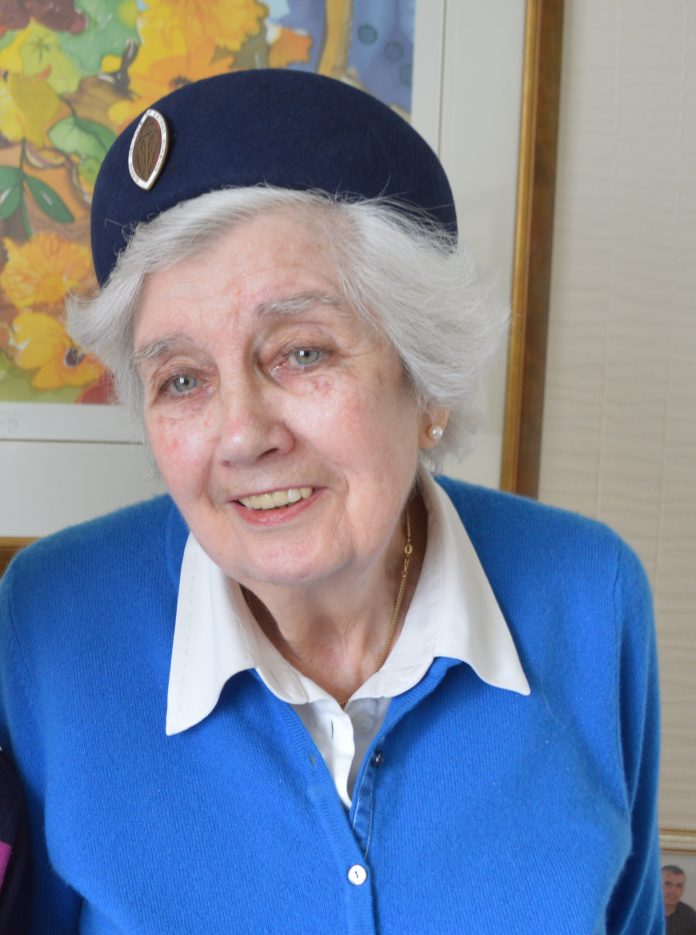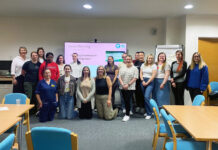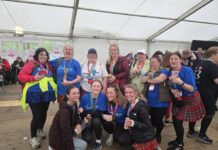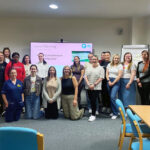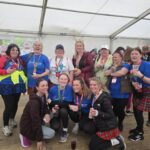Three years after the birth of the NHS, Lesley Douglas embarked on her long nursing career at the Princess Margaret Rose Hospital in Edinburgh, a children’s orthopaedic hospital. Although health was now a free service, Lesley recalls that old habits – such as dependency on donors – die hard, and there were still Board members who used to bring in gifts. In her ward, for example, they received a television at a time when hardly anyone had even seen a TV.
Lesley said: “The ward was open-ended because of lots of cases of TB and polio. We used to push the patients out onto the veranda every morning for fresh air whatever the weather. 1947 was the year of the big polio outbreak and we still had lots of children in hospital because of the deformities caused by the disease.”
At the tender age of 17 Lesley says she was unaware of the so–called working of the hospital, and just did what she was told. “Three of us started at the same time and we were issued with a uniform and a square piece of cotton cloth which we had to fold over and make into a hat. Older nurses showed us how to do it by wrapping the cloth around a biscuit tin, putting a pin in it and pulling the pleat over the pin. You had to have five eyelets on your shoes, no jewellery and you couldn’t walk over the doorstep with your uniform on, so my Mum and Dad never ever saw me in my uniform!”
“Sex education in our day was a frog and a bee, and my knowledge of the male anatomy was the statue of David in a museum! I was appointed to a little boys ward and one youngster said could he have a bottle, which I gave him. His arms were in splints up to his shoulders and he said ‘you’ll have to help me’ It sounds laughable when you think about it now.”
Her next move was to Edinburgh Royal Infirmary for general nursing. After the three year course, an extra year in the hospital resulted in a badge but Lesley left before the 12 months was up in order to get married. The matron took her aside and said she would rue the day, but rules were rules and married women could not be employed there.
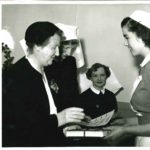 Perth Royal Infirmary had a more flexible approach so, with her husband undertaking national service and Perth her home town, Lesley moved in with her parents and started at Perth Royal Infirmary, wards 1 and 2.
Perth Royal Infirmary had a more flexible approach so, with her husband undertaking national service and Perth her home town, Lesley moved in with her parents and started at Perth Royal Infirmary, wards 1 and 2.
Perth dealt with private patients too. But Lesley said it was the same food, and the same treatment, the only benefit being that you probably saw the consultant more often. The surgical ward was a Nightingale ward but one side was reserved for gynaecology patients. “You could get deliveries up to 28 weeks in those days and we never thought they would survive.”
After the birth of her two sons, Lesley stayed at home for several years but once the boys arrived home from school, dumped their bags and said they were going out, Lesley decided it was time to return to work. Employed by Falkirk Town Council, she began district nurse training two days a week and for the following 28 years she was a well-kent figure in the district until she retired.
“I remember the poverty in the houses. One old man I visited had to share his bed with three adult grandsons. They slept top to tail with no blankets, just coats over them. That was common. The WRVS donated blankets but the patients would often take them and sell them so there were still no blankets in the house.
“There were also the box beds in a recess in a room and kitchen. These made it difficult to move a patient so you had to take your shoes off and jump onto the bed – that’s where my back problems have stemmed from. There was no manual handling training in those days.
“I remember going into a home in the old Carron area where the man, who was dying, was being looked after by his daughter. My parting shot was make sure he drinks plenty. As I left I heard the daughter say through the door ‘Does she ken the price of drink?”
Reflecting on nursing as a career Lesley said: “At the time it was hard but I think I had the best of times in nursing. It was a way of life and took up your whole life. The sisters were the gods – they ruled the roost. In Edinburgh Royal Infirmary they lived above the ward. I got fleas from one sister’s cat and there were mice in the kitchen but you never got infections. Even when I was working in Perth we never saw wound infections, you could have a patient with peritonitis and two or three drains but they healed eventually. Wounds were dressed every day and there was none of sticking a plaster over a wound and hoping for the best.”
